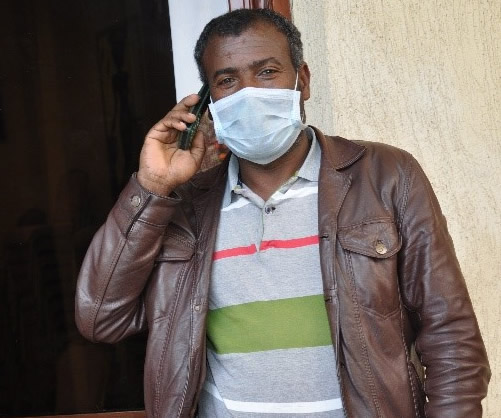Health extension workers (HEW) are a critical health workforce in the Primary Health Care Unit (PHCU) in the Ethiopian health system. They are currently leading the nation’s community-level COVID-19 response through creating awareness, conducting house-to-house active case finding, and referring suspected cases to health facilities. Supported by the mobile based training they received, they are also supporting contact tracing efforts conducted by the Rapid Response Team (RRT), and coordinating and leading the efforts of community volunteers such as women’s groups, religious leaders, Idir leaders, youth groups, and more.
Shirete Demisse, 42, is zonal health extension program coordinator in Gondar City Administration. He is in charge of coordinating the COVID-19 focused mobile based training provided to the health extension workers in Gondar. He identifies health extension workers, mainly women, orients them and follows up to ensure they properly take the training set up and provided by the Ministry of Health in collaboration with Amref Health Africa. Shirete says the training has come at the right time and is very well designed for our health extension workers to respond to the COVID-19 pandemic within their communities. “Since the pandemic is new, the health workers were badly in need of reliable information about the virus, how it is transmitted and the measures to be taken to control the spread at community level. The training is concise and very well designed for all our women health army to easily comprehend and quickly get the lessons they take off the ground,” he said.
“This is the smartest and most successful way to equip and engage our health workers in a very short period of time. We have seen that happening in our area. From the total 102 health extension workers we have in North Gondar, 92 of them have taken the training, and they are now busy reaching out to communities. We are successful indeed,” he added.
In a bid to effectively support the health extension workers during their training and as they fan out to reach out the communities, he himself took the time to get trained ahead of them. “I had to take the training because firstly as a coordinator of the program, I need to be on top of my job. I need to be stepping into when the health workers need any support while taking the training and during implementation as well. Secondly, I myself am a health worker who needs to be well armed with the knowledge and skills to help control the transmission of the virus in my community. And above all, as members of the community, I have to be better informed and equipped to protect myself and my family, so the training has also come for me as an individual,” Shirete noted.
Shirete appreciates the efforts made by the Ministry of Health to bring other partners like Amref Health Africa on board to introduce innovations that can help address this kind of unique challenge. This digital learning technology is symbolic and it can be adapted to provide other short-term trainings to address our other health problems, which are overlooked as human and material resources are diverted towards battling against COVID-19, which is one of his concerns. He says, “As all our eyes are on COVID-19, other essential health services are hampered. This is what I have observed. We are of course orienting our health extension workers not to miss the fact that the communities they serve still need them to address other health challenges they face every day. It is very important to remind them of this reality.”
Amref Health Africa in collaboration with Ministry of health has been rolling out this training since May 2020. The organization anticipates future collaboration with the Ministry to adapt this mobile based platform to offer additional trainings for HEWs in other areas such as maternal and child health.
Amref Health Africa teams up with African communities to create lasting health change.

